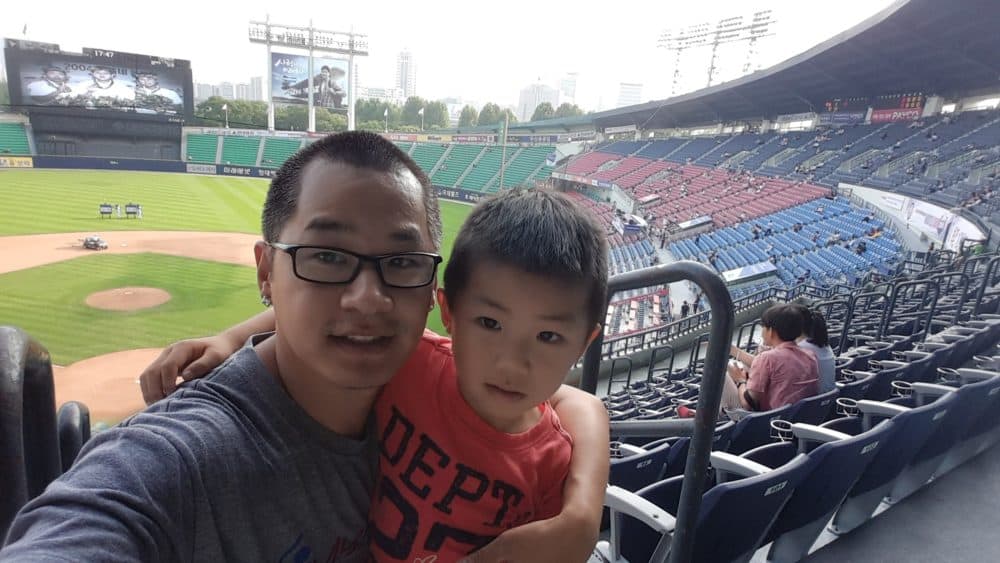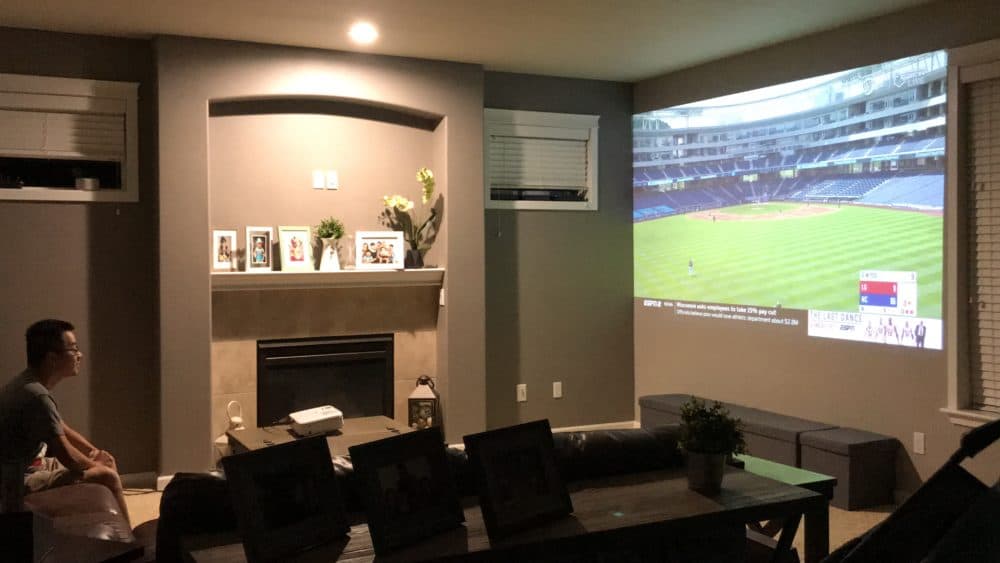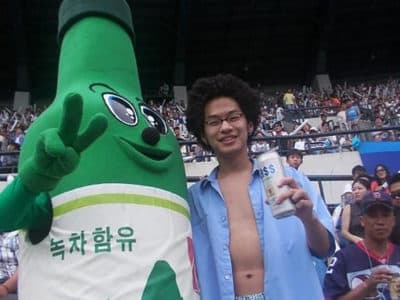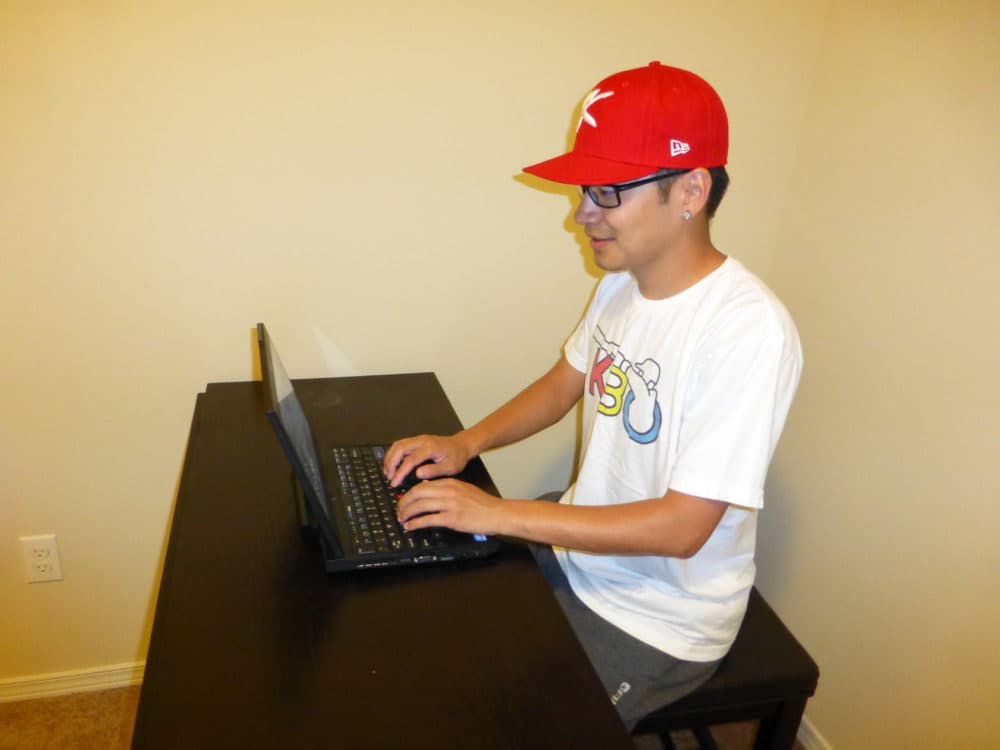Advertisement
How A 20-Year Korean Baseball Obsession Became A Home Run

Live baseball has returned to American television — with the Korea Baseball Organization, or KBO. Last week's opening day matchup between the NC Dinos and the Samsung Lions was the first live professional baseball game to be broadcast in the United States since spring training was suspended on March 12. It was also the first KBO game ever shown on ESPN.
For Dan Kurtz, this was a particularly exciting moment. He's a long-time KBO fan who runs a website called MyKBO.net.
KG: I want to start with opening day. It was late night on May 4, for you on the West Coast. Early morning, May 5, for me on the East Coast. You put your kids to bed. You settled in. This is probably a silly question, but were you excited to be sitting down to watch some baseball?
DK: I was very excited. One, to be able to watch any live sport. And then two, to have it be the Korea Baseball Organization. For the last 20 years, I followed this organization. To be able to sit down on my couch here in the United States and turn it on to live TV, I was literally there pinching myself going, "Is this real? Am I ... am I dreaming?"

KG: All right. So you went to bed, and the next morning you woke up to a bunch of messages. Tell me about that.
DK: Yes. So it was late night out here even. I mean, it was like a 10 o'clock start. So I watched 'til the very end. It was like 1 o'clock. I have three kids that wake up, you know, need to be fed. So go to bed. Wake up. I start getting messages on social media, mentions that says, "Hey, great news: Your site's down. Bad news: Your site's down." I was just waking up. I'm like, "What does that mean?" And then I checked. And the site was running slow. That's why, thus, I got the tweets and everything saying, "We can't log on or find information."
KG: So, when you looked at the stats for opening day, how did they compare to, like, last year's opening day on your website?
DK: So, compared to 2019 opening day, we were up by 27 times more traffic on our site. And it probably would have been more had it not lagged and basically crashed because the server got overloaded. And it wasn't due to like bandwidth, but there was no more room for people. We've had traffic from all over the world. I think the only continent that we haven't hit yet was from Africa ... yet.
It is a good problem to have because that means their interest is high, but it also — we're trying to work on some things to try to make sure that it's technologically OK as the interest seems to have continued for another week.
KG: Yeah. Yeah. All right. So now that we've established that this is a very big moment for you and for MyKBO.net, I want you to go back and explain how this all began. And really, in some ways, it starts with you growing up as a Philadelphia Phillies fan, right?

DK: Yes, that is correct. Because I grew up in Eastern Pennsylvania, I ended up loving all sports. Any kind of pro sports. But, to go all the way back to my birth, I was adopted from South Korea when I was four months old. I did not return there until I was 19 years old, and I took a motherland tour trip with fellow adoptees.
And that's when I briefly learned that Korea, at that time, had a professional baseball league, which growing up, I had no clue. The internet was just starting out. It wasn't like I was able to do Wikipedia back then. So it wasn't 'till the following year when I was 20 years old, and I studied abroad that I was able to experience my first KBO game, and that's what got me hooked.
KG: What about that day really sucked you in?
DK: I walk into the Jamsil Stadium area, just on the outside. And so there's not a lot of like tailgating going on out there. But they just — it's just busy. They've got vendors selling food. Vendors, you know, kind of like at a Major League stadium, but this was just tons of 'em. So you come out of the subway stations, you could feel the buzz. It was already loud on the outside of like — they're getting prepped for it. And then when I entered the stadium, the game hadn't even started yet. You know, it was really loud.
I'm like, "Wow, OK. It's going to quiet down here," because I'm used to the Philadelphia Phillies. You know, the Vet[erans Stadium] at that time just being dead. It did not. As soon as the game started, that's when it became louder. The music is blaring.
DK: They're cheering no matter what's happening on the field. I remember Tyrone Woods hitting a home run. The stadium erupting. That was the moment when I was like, "I gotta come back. I have to figure out who that player is, why he's playing over here and find out more about this team." Because that experience was just one that I had never experienced at a sporting event, let alone a baseball game.
KG Wow. So, what inspired you to start a website?
DK: Well, my Korean language skills were zero. When I studied abroad for a year, I took basic Korean language classes, basically learned the ABCs of Korean. So I was able to read and understand, like, 10 percent.
At that time, when I wanted to find out more about the baseball player Tyrone Woods or the team, there was no information in English. So, I had to use my broken Korean skills to try to find that information about him. And then, slowly out of that, I just decided to make a web form, a message board, which was also popular back then on the internet. And, literally, in the very beginning I was the only member, and I was literally posting stats and schedules and information about the KBO to myself. And I'd be like, here's who's playing and then follow it up the next day, here's the scores. I just tried to put the information out there that I deem, you know, informative, that I find fun.

KG: So, by the time this season came around, like 18 years later, you were mostly using Twitter to get the word out for the league. Before the KBO announced that it would be one of the first sports leagues to return from the coronavirus, and rumors started that ESPN would air those games, do you have a sense of how many people were following you?
DK: Yes. Somebody asked, so I had to go look back. I had about 6,000 followers at that time, pre-ESPN announcement — we'll put it that way. Now post-ESPN announcement, my friend made me check today, and it's like up over 18,000.
Never in my dreams — it was never my goal to, I guess, gain followers just for the sake of gaining followers. I just want to spread information about the KBO and the league. I mean, the fact that 18,000 people are now following the account is mind-blowing to me. And I love it because that means they're new KBO fans.
KG: Well, you've done a lot of interviews over the years. Like you say, there aren't a lot of people who are English language-speaking experts on this league. But, this time, you actually appeared on ESPN. What was that like?
DK: Well, yes. And when you said expert, I'm always like, "I'm not really an expert. I'm just a fan that by default was geeky enough to have 20 years of a website." My family would just laugh and be like, "It's, you know, it's very niche." And I was like, "I know it is." And now all of a sudden this week, I'm like, "Look how niche it is. It made SNL."
DK: "It made The Onion. It made TMZ." I was like, "This is blowing my mind." And then I turn on Twitter, and I’m like, "Holy cow, these people are just randomly picking teams and loving it." I mean, just because they like the colors or mascots. This is what it feels like, I guess, when I try to pick like a Premier League team or something.
Even being asked to be on ESPN was surreal. Having my COVID-19 haircut nationally seen on TV — because literally two days before my wife gave me the haircut. I'm like, "Yeah, that's fine. You can mess up, because my hair grows fast and nobody's gonna see it."
I had — that night before I was on, I had to wake up at like 2:30, 3 o'clock to get ready for it. So I had spent all night prepping for, like, possible questions that they might ask, which wasn't even about the teams. It was just, like, comparison and like stadiums and stuff. So I had that all ready to go. And then they asked me something like about "Why do these players wear triple digit numbers?"
Advertisement
If you're curious, the reason is because these are the undrafted minor league players. They can’t appear in a game until they switch it, so that they’re not "undrafted" training players. So, that's the full answer to that question. But, yes, deer in the headlights moment. And I got through it. So I have newfound respect because my one inning, I was just sitting there going, "Is this over yet? Is this over yet?" Because I was like, "This is the most nerve wracking interview I've ever had in my life."
KG: Well, speaking of those ESPN broadcasts, teams have been pumping in crowd noise and the spirit squads — or cheerleaders, whatever you want to call them — they're still leading cheers, even though the only fans in attendance are cardboard cutouts. Do you think people like me who are watching these games for the first time are getting an accurate view of what this league is like?
DK: Well, is this the new normal for, you know, the KBO or even for professional sports? I don't know. But, from at least the previous 19 years that I've been watching the league, this is not normal. It is a stark contrast to when I am turning on a game, and I can hear the bat hit the ball, hear the ball go into the glove. You hear umps talking. You hear on the telecast — maybe not on the ESPN telecast, but on the Korean telecast, you can hear the umps talking to the coaches. And the one time, he was like to the third base coach, "You can't come on the field without your mask," because that's the COVID-19, you know, rules for the league. And like you'd heard that exchange. And they don't even have field mics at that time. It was just being picked up by the broadcast. So it is very different.
"Whether the KBO is able to retain thousands of fans, hundreds of fans, or even just one new fan, it's one new fan that they would have never gotten without this TV deal with ESPN."
Dan Kurtz
KG: What should American baseball fans tuning into the KBO for the first time know?
DK: I know everybody loves their comparisons to MLB teams. So the Kiwoom Heroes, which actually stick out because they are — out of the 10 teams, they are the only team that’s not owned by a company. They are privately owned by stockholders. They are more fiscally-minded than any of the other teams. So that’s why two of their players have already come over to the Major Leagues with Byung-ho Park to Minnesota and Jung-ho Kang to the Pittsburgh Pirates. So they would probably be like the Oakland As, Tampa Bay Rays.
KG: I don't think I'm going out on a limb by suggesting that when other leagues resume play, a lot fewer people will be paying attention to the KBO. What would you say to encourage them to keep watching?
DK: I would say, "You know what? Obviously, when major leagues come back, and the other pro sports here in North America come back, you're gonna start focusing on them. I myself am gonna focus on them. It's just easier. Nobody wants to wake up at 2 a.m. to throw on a baseball game."
But I would just encourage them to maybe check in towards the fall, during the playoff run, to see, "Hey, let's see if the team that I liked and, you know, back in May is still there." And it's gonna be broadcast this whole season on ESPN. So I just encourage everybody [to] kinda stick with it. If you're bored one night or even during the replay, DVR it, tape it, throw it on and just kind of see what it's like. Hopefully the fans will be back in there, so you have a totally new perspective. Whether the KBO is able to retain thousands of fans, hundreds of fans, or even just one new fan, it's one new fan that they would have never gotten without this TV deal with ESPN.
Dan Kurtz is a fan, who writes about the Korea Baseball Organization on Twitter and through his website, MyKBO.net.
This segment aired on May 16, 2020.

